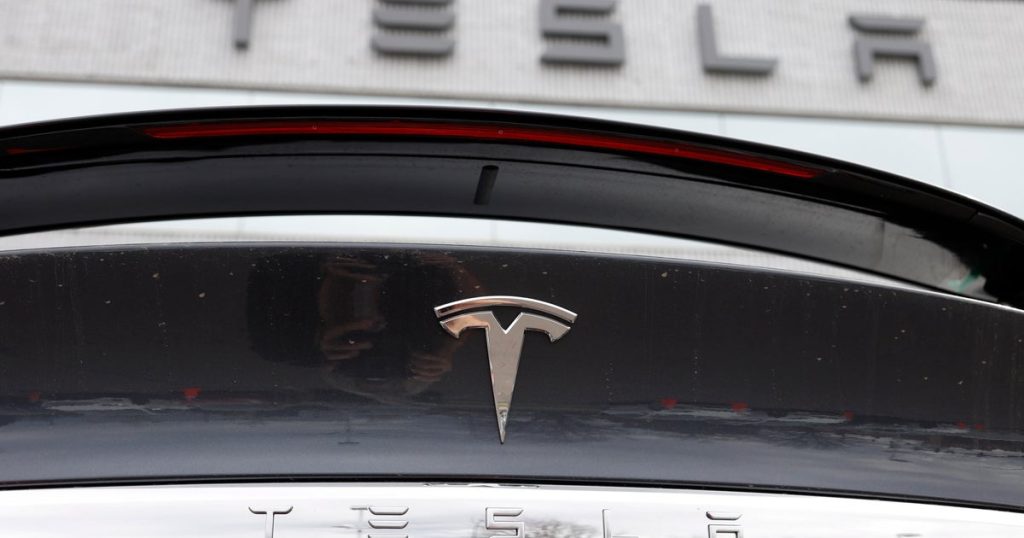Tesla has reported a significant decline in vehicle deliveries during the first quarter of 2025, with numbers falling nearly 13% compared to the same period last year. The automaker shipped a total of 336,681 vehicles, a figure that missed the expectations of analysts who had anticipated around 350,000 deliveries. This downturn is attributed not only to weakened demand but also to growing consumer backlash against CEO Elon Musk due to his controversial work with the Department of Government Efficiency (DOGE), exacerbating existing challenges within the company.
| Article Subheadings |
|---|
| 1) Declining Delivery Numbers Cause Concerns |
| 2) Impact of Political Engagement on Tesla’s Brand |
| 3) Market Response to Tesla’s Performance |
| 4) Competitive Landscape in the EV Market |
| 5) Future Outlook for Tesla |
Declining Delivery Numbers Cause Concerns
Tesla’s first-quarter delivery numbers have raised significant concerns among stakeholders, with the company reporting a total of 336,681 vehicles shipped. This figure represents a decrease from 386,810 units delivered in the same timeframe last year, translating to a nearly 13% decline. Market analysts had predicted that Tesla would deliver approximately 350,000 vehicles for this period, indicating a widening gap between investor expectations and actual performance. According to analyst Dan Ives from Wedbush, the disappointing numbers reveal “continuous negativity” surrounding the Tesla brand, categorizing the delivery report as a “disaster for the bulls.”
Impact of Political Engagement on Tesla’s Brand
A central factor contributing to Tesla’s declining demand appears to be the backlash against Elon Musk‘s involvement with DOGE, an initiative advocating for reduced government spending and agency closures under the Trump administration. The political ramifications of this engagement have led some consumers to reassess their preferences in electric vehicle brands. Analyst Dan Ives suggests that Musk’s increased political profile is adversely affecting Tesla, indicating that “the more political the billionaire becomes, the more the brand suffers.” This further complicates the already fragile state of Tesla’s consumer relations and brand perception.
Market Response to Tesla’s Performance
The poor delivery numbers have resulted in a considerable stock decline, with Tesla shares dropping by 4.8% or $12.77, landing at $255.69 during early trading sessions following the report. Not only has the stock price decreased sharply since its December high of $479, but it also reflects the growing dissatisfaction among investors regarding the company’s management and strategic direction. Falling short of expectations has further exacerbated the uncertainty among shareholders, prompting urgent calls for Musk to regain focus on Tesla and distance himself from polarizing political engagements.
Competitive Landscape in the EV Market
Tesla’s struggles are compounded by increasing competition in the electric vehicle market. Rivals such as BMW and Toyota are releasing a variety of electric, hybrid, and plug-in hybrid options, capturing consumer interest that has begun to veer away from Tesla’s aging lineup. While the company is anticipated to unveil a new lower-cost model later this year, analysts are already questioning whether this will be sufficient to reclaim market share and foster renewed customer interest in the Tesla brand.
Future Outlook for Tesla
Despite the current challenges facing Tesla, there remains cautious optimism about the company’s future. Analysts, like Dan Ives, assert that for Tesla to turn around its fortunes, Musk needs to re-prioritize his commitments. Ives warns, “Musk needs to get his act together or else unfortunately darker times are ahead for Tesla.” The pressing question remains whether Tesla can navigate this tumultuous landscape while continuing to innovate and adapt in an increasingly competitive electric vehicle market.
| No. | Key Points |
|---|---|
| 1 | Tesla’s delivery numbers fell by nearly 13% in the first quarter of 2025. |
| 2 | Analysts expected deliveries to be around 350,000, showcasing a significant shortfall. |
| 3 | Musk’s political activities are reportedly harming Tesla’s brand image. |
| 4 | Rival automakers are increasingly capturing market share with diverse electric offerings. |
| 5 | The future of Tesla hinges on Musk’s ability to refocus on core company objectives. |
Summary
Tesla’s declining delivery figures in the first quarter of 2025 reflect a broader crisis facing the automaker, exacerbated by CEO Elon Musk‘s controversial political engagement. As the electric vehicle market continues to grow with fierce competition, the company’s ability to adapt and innovate while maintaining a strong brand image has never been more critical. Investors are anxious for effective strategies that will reinvigorate Tesla’s sales and reputation moving forward.
Frequently Asked Questions
Question: What were Tesla’s delivery numbers for the first quarter of 2025?
Tesla delivered 336,681 vehicles during the first quarter of 2025, which is a decline of nearly 13% compared to the same period last year.
Question: How are Tesla’s stock prices reacting to the recent delivery news?
Following the disappointing delivery numbers, Tesla’s stock fell by 4.8%, reflecting growing investor concern about the company’s performance and management.
Question: What impact has Elon Musk’s political involvement had on Tesla?
Musk’s political activities, particularly his role with the Department of Government Efficiency, have reportedly led to backlash from consumers, negatively affecting the Tesla brand image and sales performance.
